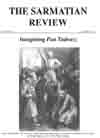The Literary Canon and Translation. Polish Culture as a Case Study
The Literary Canon and Translation. Polish Culture as a Case Study
Author(s): Piotr WilczekSubject(s): Literary Texts
Published by: Polish Institute of Houston
Summary/Abstract: What constitutes a canon? A question formulated in this way can provoke a variety of answers. A canon may be defined as a collection of key works of literature; it can refer to philosophical, political, and religious texts that a particular society has come by consensus to regard as foundational. Today the term canon has come to signify authors and works that either used to be included in literature syllabi or textbooks, or those works that repeatedly appear in standard volumes of the history of literature, bibliographies, and literary criticism. The canon has become an issue of much contention in the humanities. The purpose of the debate, interestingly enough, has not been (as one might have assumed) about alterations, but instead about comprehending why the canon is as it is, how it was formulated, and how circumstances can alter and condition its supposedly timeless content. The canon has come to be viewed by some as “the expression of cultural authority created by other people influential in the past”; it has been defined as “the space of cultural conflict” and as “debatable ground, the ground of the battle between various groups, practices and institutions”. This ongoing “hermeneutics of suspicion” can produce one of two consequences: either a new canon is established, or the very notion of a canon is called into question. As Jeremy Hawthorn noted: “When feminist critics started to construct a rival canon or canons, not always as a replacement for the ‘official’ canon but also as an alternative to it, then this struck at the claim to universality that lay behind the idea of a single canon. For, in a traditional sense, if there were several canons then there was no canon.”
Journal: The Sarmatian Review
- Issue Year: XXXII/2012
- Issue No: 03
- Page Range: 1687-1692
- Page Count: 6
- Language: English

